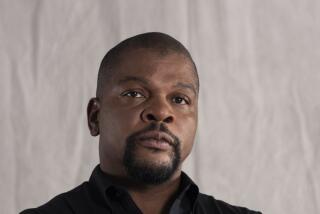Edith R. Wyle, Founder of Craft and Folk Art Museum, Dies
- Share via
Edith R. Wyle, whose passion for humanistic, universally meaningful art propelled her to establish Los Angeles’ popular Craft and Folk Art Museum and Festival of Masks, died Tuesday at the age of 81.
She died in her sleep at her West Los Angeles home after battling cancer, said Patrick Ela, chairman of the museum’s board of trustees. Often called the high priestess of folk art and crafts, Wyle devoted more than 30 years of her life to persuading all those who would listen that the work of traditional artisans and adventurous craftspeople deserved to be recognized as fine art.
“I think we can take the ‘y’ out of artsy-craftsy now,” Wyle told an interviewer in 1971. But the self-confessed “chronic enthusiast” never stopped promoting the virtues of the handmade work she loved.
Born in San Francisco on April 21, 1918, she was the daughter of Louis and Rose Robinson. Both of her parents were musicians, but Louis Robinson became a dentist and moved the family to Los Angeles when Edith was a child.
In 1942, she married Frank S. Wyle, who established Wyle Labs, a semiconductor and computer systems distribution company. While raising their three children, Edith began to cultivate her interest in painting. Her mentor was Rico Lebrun, a California artist who painted tortured figures based on European Old Master works and taught his students that art could deliver a socially useful message.
Wyle knew that Lebrun’s philosophy was unfashionable, but it had a strong appeal for her as she became increasingly disenchanted with Minimalism and other forms of abstraction that found favor in leading galleries and museums in the early 1960s. Looking for an art form that she could believe in, she turned to the handmade products of people who perpetuated indigenous cultural traditions or expressed themselves in functional objects, without regard for artistic trends.
Her mission took visible shape in 1965, when she opened the Egg and the Eye, an innovative restaurant and shop on Wilshire Boulevard. Located in an old brick building near the then-new Los Angeles County Museum of Art, the Egg and the Eye served 54 kinds of omelets and offered an international array of folk art and contemporary crafts.
Wyle’s creation was an immediate hit. Arriving at a moment when the crafts movement had caught fire, the establishment became a popular gathering place and source of exotic gifts. But Wyle had difficulty making ends meet, so in 1973 the Egg and the Eye became the nonprofit Craft and Folk Art Museum.
The museum presented an eclectic program of exhibitions, featuring Guatemalan textiles, Amish quilts, Japanese toys and furniture by Sam Maloof and architect Alvo Aalto, among many other attractions. Determined to make the institution “a living museum,” Wyle also initiated a variety of workshops and educational programs.
In 1976 she took her passion into the streets in a public parade of masks designed to celebrate the diverse ethnic heritage of the city and to provide an arena for cross-cultural exchange. The parade evolved into the Festival of Masks, a broad-based community celebration that is now a biannual event.
Wyle began to step back from the museum’s day-to-day operations in 1985, when she promoted Ela to the position of executive director. During the late 1980s he oversaw an ambitious plan to build a 22-story tower to house the museum, along with retail stores, offices and condominiums. The old building was in need of repair, so the museum temporarily moved to the nearby May Co. as fund-raising began. But the economy soured, so museum officials dropped the development project and drew up a new plan to refurbish the Wilshire Boulevard property.
The museum was relatively dormant until 1995, when it was reopened after a $5.5-million renovation and seismic upgrading. It was a bittersweet event for Wyle.
“Yesterday when I stood out there and saw the sign go up, I cried. This is my baby,” she said at the reopening celebration. But, as she knew, the baby was not in perfect health. The museum was in debt and it never recovered its audience. At the end of 1997, after Wyle had rejected a proposed merger with the Los Angeles County Museum of Art, the Craft and Folk Art Museum closed its doors. The following spring, most of the museum’s folk art collection was sold at auction for $282,164 and the library was given to LACMA.
Nonetheless, Wyle’s legacy continues both in the Festival of Masks and the Craft and Folk Art Museum, which has gained a new life in its old location across from LACMA--albeit on a greatly reduced scale--under the administration of the city of Los Angeles Cultural Affairs Department.
Wyle is survived by her husband; a son, Stephen Wyle; daughters Nancy Romero and Diana Munk; eight grandchildren; and three great-grandchildren.
The family requests that, in lieu of flowers, donations be made to the Craft and Folk Art Museum.
More to Read
The biggest entertainment stories
Get our big stories about Hollywood, film, television, music, arts, culture and more right in your inbox as soon as they publish.
You may occasionally receive promotional content from the Los Angeles Times.










